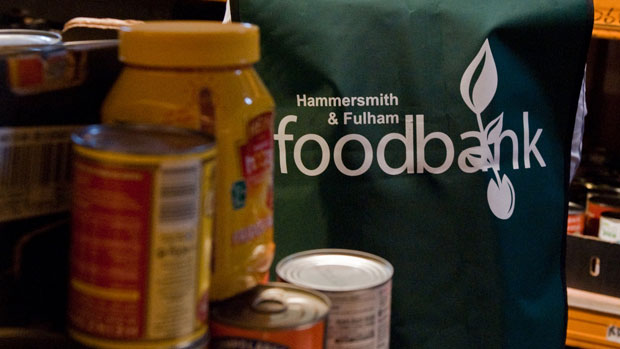Income gap between rich and poor almost doubled between 2000 and 2012
Men from poorer backgrounds are more likely to be single in middle age than before

A free daily email with the biggest news stories of the day – and the best features from TheWeek.com
You are now subscribed
Your newsletter sign-up was successful
Income disparity between rich and poor families "almost doubled" between 2000 and 2012, according to The Independent.
A study by the Institute for Fiscal Studies found that men in middle age and from poorer backgrounds were significantly more likely to be single in 2012 than their predecessors, says the Financial Times.
As men from richer backgrounds are more likely to have a partner – "and their partners were more likely to be higher earners" – this divergence only exacerbates income inequality.
The Week
Escape your echo chamber. Get the facts behind the news, plus analysis from multiple perspectives.

Sign up for The Week's Free Newsletters
From our morning news briefing to a weekly Good News Newsletter, get the best of The Week delivered directly to your inbox.
From our morning news briefing to a weekly Good News Newsletter, get the best of The Week delivered directly to your inbox.
The study is based on secondary analysis of data from two large surveys, the National Child Development Study that began in 1958 and the British Cohort Study that began in 1970, with figures adjusted for inflation over time.
The research found that men born in 1958 whose family income was in the poorest fifth of households when they were 16 earned an average of £720 a week by the age of 42 in 2000 (figures have been adjusted to reflect 2016 rates after inflation).
The same figure for someone from the richest fifth of households was £1,060 – a gap of 47 per cent.
A similar analysis of those born in 1970 found that by 2012 (and by the age of 42) men from the poorest and richest fifths earned £680 and £1,270 respectively after inflation – a gap of 88 per cent.
A free daily email with the biggest news stories of the day – and the best features from TheWeek.com
Once tax and in-work benefits are taken into account the gap fell to 63 per cent in 2012. This means government policies are reducing the income gap by 25 percentage points, a more progressive outcome than in 2000 when the gap was reduced by 17 percentage points.
The figures only relate to those in work and do not take account of people on benefits. This perhaps helps to explain the contrast with official figures for the population as a whole.
These show that income inequality has been broadly stable since the early 1990s – and that the gap between the very richest and poorest has in fact declined since the financial crisis because the earnings of the top one per cent have fallen the most.
"But the Government's planned cuts to tax credits over the next three years are projected to cause a sharp increase in inequality, even on this measure," says the Independent.
-
 The ‘ravenous’ demand for Cornish minerals
The ‘ravenous’ demand for Cornish mineralsUnder the Radar Growing need for critical minerals to power tech has intensified ‘appetite’ for lithium, which could be a ‘huge boon’ for local economy
-
 Why are election experts taking Trump’s midterm threats seriously?
Why are election experts taking Trump’s midterm threats seriously?IN THE SPOTLIGHT As the president muses about polling place deployments and a centralized electoral system aimed at one-party control, lawmakers are taking this administration at its word
-
 ‘Restaurateurs have become millionaires’
‘Restaurateurs have become millionaires’Instant Opinion Opinion, comment and editorials of the day
-
 Home Office worker accused of spiking mistress’s drink with abortion drug
Home Office worker accused of spiking mistress’s drink with abortion drugSpeed Read Darren Burke had failed to convince his girlfriend to terminate pregnancy
-
 In hock to Moscow: exploring Germany’s woeful energy policy
In hock to Moscow: exploring Germany’s woeful energy policySpeed Read Don’t expect Berlin to wean itself off Russian gas any time soon
-
 Were Covid restrictions dropped too soon?
Were Covid restrictions dropped too soon?Speed Read ‘Living with Covid’ is already proving problematic – just look at the travel chaos this week
-
 Inclusive Britain: a new strategy for tackling racism in the UK
Inclusive Britain: a new strategy for tackling racism in the UKSpeed Read Government has revealed action plan setting out 74 steps that ministers will take
-
 Sandy Hook families vs. Remington: a small victory over the gunmakers
Sandy Hook families vs. Remington: a small victory over the gunmakersSpeed Read Last week the families settled a lawsuit for $73m against the manufacturer
-
 Farmers vs. walkers: the battle over ‘Britain’s green and pleasant land’
Farmers vs. walkers: the battle over ‘Britain’s green and pleasant land’Speed Read Updated Countryside Code tells farmers: ‘be nice, say hello, share the space’
-
 Motherhood: why are we putting it off?
Motherhood: why are we putting it off?Speed Read Stats show around 50% of women in England and Wales now don’t have children by 30
-
 Anti-Semitism in America: a case of double standards?
Anti-Semitism in America: a case of double standards?Speed Read Officials were strikingly reluctant to link Texas synagogue attack to anti-Semitism